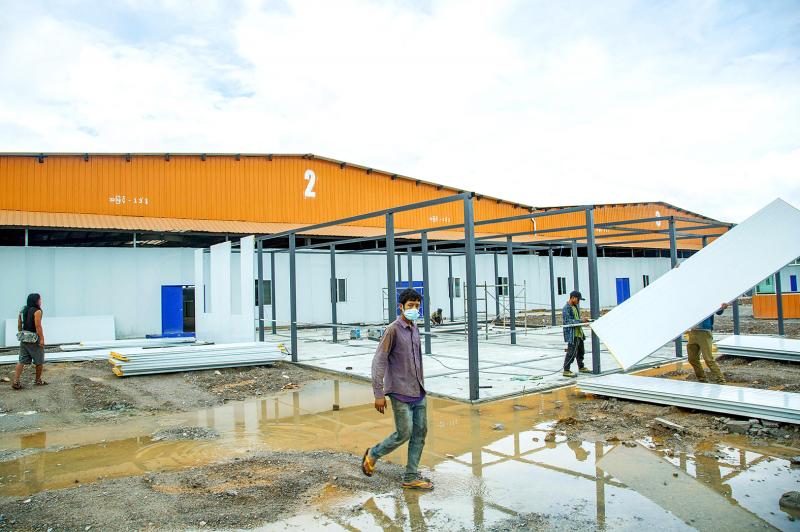Delivering vaccines to Myanmar’s junta, but also to rebel groups that are the generals’ sworn enemies, China is playing both sides to strengthen its hand in the messy politics of its southern neighbor.
Beijing has already handed over nearly 13 million doses to the generals, who in February ousted the government of civilian leader Aung San Suu Kyi and plunged Myanmar and its healthcare system into chaos.
The junta has appeared powerless to halt the spread of the virus, spooking authorities on the other side of its porous, 2,000km frontier with China, where officials are waging a “zero case” war on COVID-19.

Photo: AFP
So Beijing has quietly shipped thousands of vaccines, medical workers and construction materials for quarantine centers, multiple rebel groups told reporters.
Chinese Red Cross staff “come to help us sometimes ... to help us prevent the COVID pandemic, but they did not come to stay here,” said Colonel Naw Bu, spokesman for the Kachin Independence Army (KIA).
Naw Bu’s group, which numbers in the thousands, controls territory in Myanmar’s northern jade-rich hills.
“They just came for a while and went back,” he said.
The KIA is one of Myanmar’s more than 20 ethnic rebel groups — many of whom control swathes of remote border territory — who have fought each other and the military over the drugs trade, natural resources and autonomy.
However, they are all vulnerable to COVID-19.
The Shan State Progress Party rebel group has vaccinated 1,000 people in areas under its control with Chinese vaccines, a spokesperson told reporters.
It had ordered half a million doses, he said.
“Good neighbor” China had also promised to supply doses to the Ta’ang National Liberation Army, based in nearby territory, spokesman Brigadier General Tar Phone Kyaw told reporters.
Meanwhile, in the border town of Muse, men work on a new quarantine center that is to house up to 1,000 beds for traders keen to resume business with China.
The workers are Burmese nationals, but the building materials were all provided by authorities in China’s Yunnan Province.
The aid is receiving none of the fanfare of Beijing’s diplomacy elsewhere in Asia and across Africa.
“China will as always, according to their needs, provide necessary assistance and support to the Myanmar people in their fight against the epidemic,” a Chinese Ministry of Foreign Affairs spokesman said when asked if Beijing was helping insurgent groups fight COVID-19.
Enze Han (韓恩澤), a University of Hong Kong associate professor in public administration, said it “makes sense” for authorities across the border to help.
“If China wants to protect itself from COVID ... it needs to create a buffer zone,” Han told reporters.
Ethnic Chinese groups, using Chinese SIM cards and currency, live along the border in areas “basically grafted onto the lower belly of China,” said David Mathieson, an analyst formerly based in Myanmar.
If major clashes between rebels and the military broke out — as they did in 2017, sending thousands fleeing into China — it would be a “worst-case scenario” for Beijing, Mathieson said.

Drug lord Jose Adolfo Macias Villamar, alias “Fito,” was Ecuador’s most-wanted fugitive before his arrest on Wednesday, more than a year after he escaped prison from where he commanded the country’s leading criminal gang. The former taxi driver turned crime boss became the prime target of law enforcement early last year after escaping from a prison in the southwestern port of Guayaquil. Ecuadoran President Daniel Noboa’s government released “wanted” posters with images of his face and offered US$1 million for information leading to his capture. In a country plagued by crime, members of Fito’s gang, Los Choneros, have responded with violence, using car

Two former Chilean ministers are among four candidates competing this weekend for the presidential nomination of the left ahead of November elections dominated by rising levels of violent crime. More than 15 million voters are eligible to choose today between former minister of labor Jeannette Jara, former minister of the interior Carolina Toha and two members of parliament, Gonzalo Winter and Jaime Mulet, to represent the left against a resurgent right. The primary is open to members of the parties within Chilean President Gabriel Boric’s ruling left-wing coalition and other voters who are not affiliated with specific parties. A recent poll by the

TENSIONS HIGH: For more than half a year, students have organized protests around the country, while the Serbian presaident said they are part of a foreign plot About 140,000 protesters rallied in Belgrade, the largest turnout over the past few months, as student-led demonstrations mount pressure on the populist government to call early elections. The rally was one of the largest in more than half a year student-led actions, which began in November last year after the roof of a train station collapsed in the northern city of Novi Sad, killing 16 people — a tragedy widely blamed on entrenched corruption. On Saturday, a sea of protesters filled Belgrade’s largest square and poured into several surrounding streets. The independent protest monitor Archive of Public Gatherings estimated the

Irish-language rap group Kneecap on Saturday gave an impassioned performance for tens of thousands of fans at the Glastonbury Festival despite criticism by British politicians and a terror charge for one of the trio. Liam Og O hAnnaidh, who performs under the stage name Mo Chara, has been charged under the UK’s Terrorism Act with supporting a proscribed organization for allegedly waving a Hezbollah flag at a concert in London in November last year. The rapper, who was charged under the anglicized version of his name, Liam O’Hanna, is on unconditional bail before a further court hearing in August. “Glastonbury,